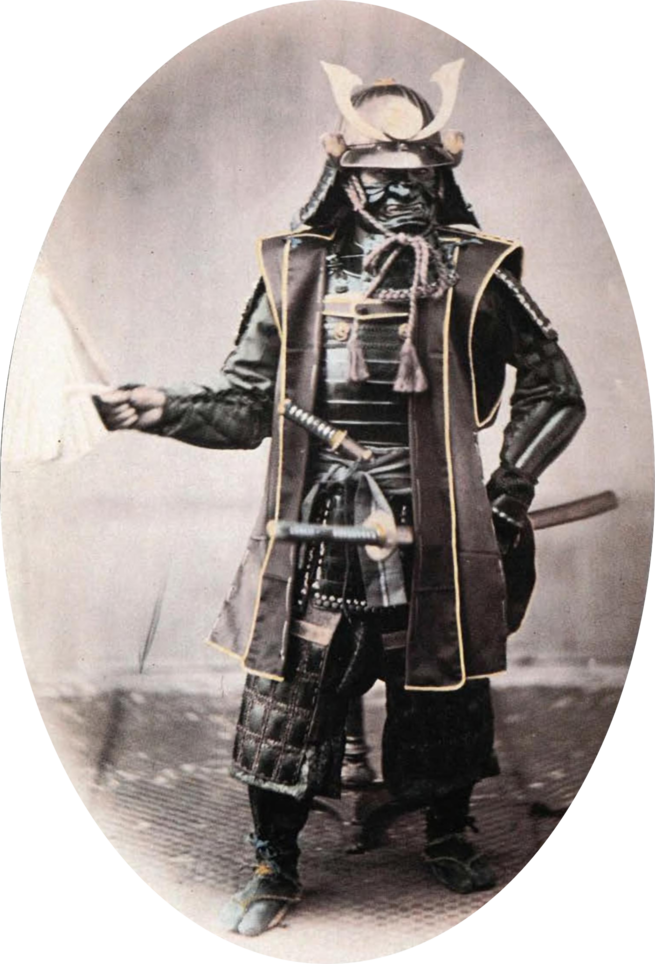
Main Difference
The main difference between Samurai and Knight is that the Samurai is a military nobility of pre-industrial Japan and Knight is a person granted an honorary title by a monarch or other political leader
-
Samurai
Samurai (侍) were the military nobility and officer caste of medieval and early-modern Japan.
In Japanese, they are usually referred to as bushi (武士, [bɯ.ɕi]) or buke (武家). According to translator William Scott Wilson: “In Chinese, the character 侍 was originally a verb meaning “to wait upon”, “accompany persons” in the upper ranks of society, and this is also true of the original term in Japanese, saburau. In both countries the terms were nominalized to mean “those who serve in close attendance to the nobility”, the Japanese term saburai being the nominal form of the verb. According to Wilson, an early reference to the word “samurai” appears in the Kokin Wakashū (905–914), the first imperial anthology of poems, completed in the first part of the 10th century.
By the end of the 12th century, samurai became almost entirely synonymous with bushi, and the word was closely associated with the middle and upper echelons of the warrior class. The samurai were usually associated with a clan and their lord, and were trained as officers in military tactics and grand strategy. While the samurai numbered less than 10% of then Japan’s population, their teachings can still be found today in both everyday life and in modern Japanese martial arts.
-
Knight
A knight is a person granted an honorary title of knighthood by a monarch, bishop or other political leader for service to the monarch or a Christian church, especially in a military capacity. Historically, in Europe, knighthood was conferred upon mounted warriors. During the High Middle Ages, knighthood was considered a class of lower nobility. By the Late Middle Ages, the rank had become associated with the ideals of chivalry, a code of conduct for the perfect courtly Christian warrior. Often, a knight was a vassal who served as an elite fighter, a bodyguard or a mercenary for a lord, with payment in the form of land holdings. The lords trusted the knights, who were skilled in battle on horseback.
Knighthood in the Middle Ages was closely linked with horsemanship (and especially the joust) from its origins in the 12th century until its final flowering as a fashion among the high nobility in the Duchy of Burgundy in the 15th century. This linkage is reflected in the etymology of chivalry, cavalier and related terms (see Etymology section below). The special prestige accorded to mounted warriors in Christendom finds a parallel in the furusiyya in the Muslim world, and the Greek hippeus (ἱππεύς) and Roman eques of classical antiquity.In the late medieval period, new methods of warfare began to render classical knights in armour obsolete, but the titles remained in many nations. Today, a number of orders of knighthood continue to exist in Christian Churches, as well as in several historically Christian countries and their former territories, such as the Roman Catholic Order of the Holy Sepulchre, the Protestant Order of Saint John, as well as the English Order of the Garter, the Swedish Royal Order of the Seraphim, and the Royal Norwegian Order of St. Olav. Each of these orders has its own criteria for eligibility, but knighthood is generally granted by a head of state, monarch, or prelate to selected persons to recognise some meritorious achievement, as in the British honours system, often for service to the Church or country. The modern female equivalent in the United Kingdom is Dame.
Historically, the ideals of chivalry were popularized in medieval literature, particularly the literary cycles known as the Matter of France, relating to the legendary companions of Charlemagne, and the Matter of Britain, relating to the legend of King Arthur.
-
Samurai (noun)
In feudal Japan, a soldier who served a daimyo.
-
Knight (noun)
A warrior, especially of the Middle Ages.
“King Arthur and the Knights of the Round Table”
-
Knight (noun)
A young servant or follower; a military attendant.
-
Knight (noun)
Nowadays, a person on whom a knighthood has been conferred by a monarch.
-
Knight (noun)
A chess piece, often in the shape of a horse’s head, that is moved two squares in one direction and one at right angles to that direction in a single move, leaping over any intervening pieces.
-
Knight (noun)
A playing card bearing the figure of a knight; the knave or jack.
-
Knight (verb)
To confer knighthood upon.
“The king knighted the young squire.”
-
Knight (verb)
To promote (a pawn) to a knight.
